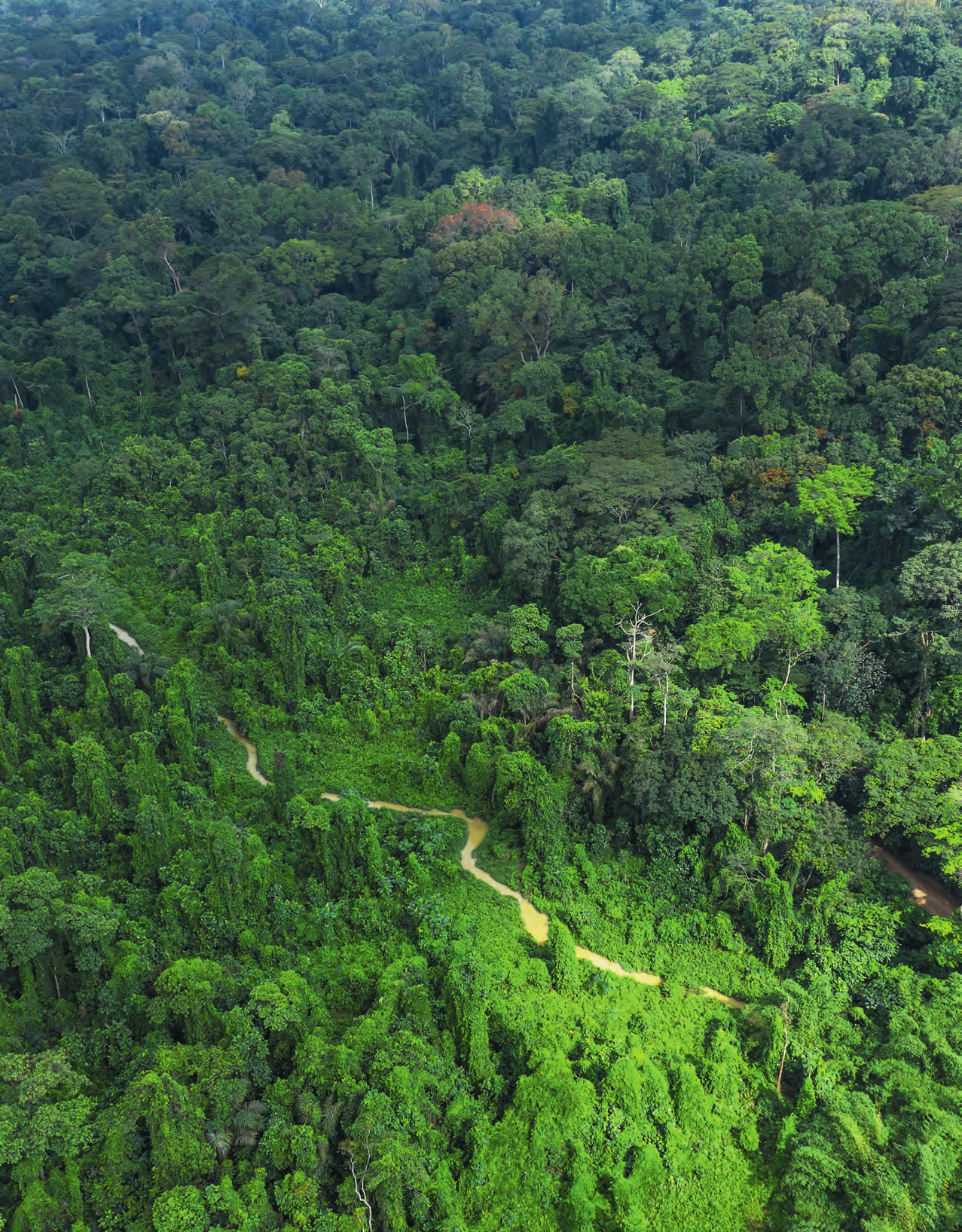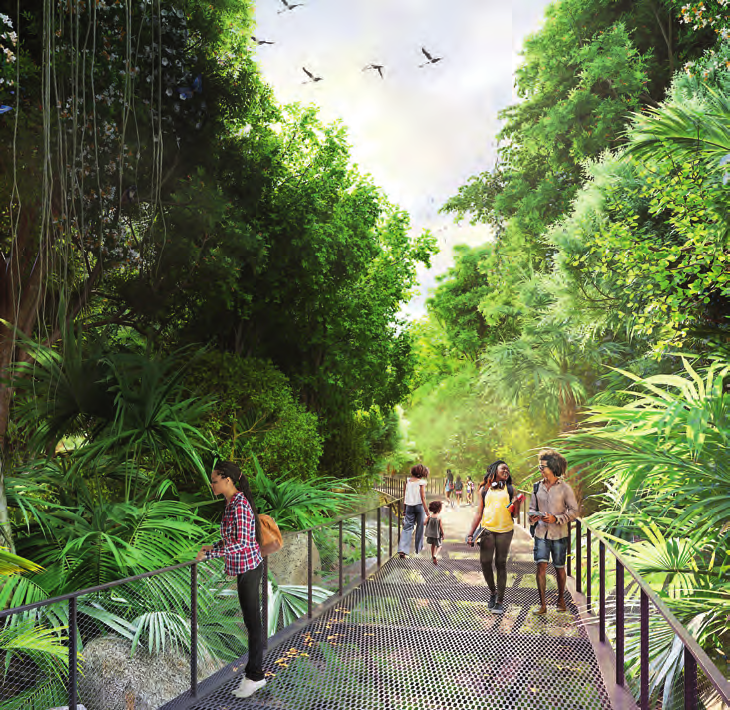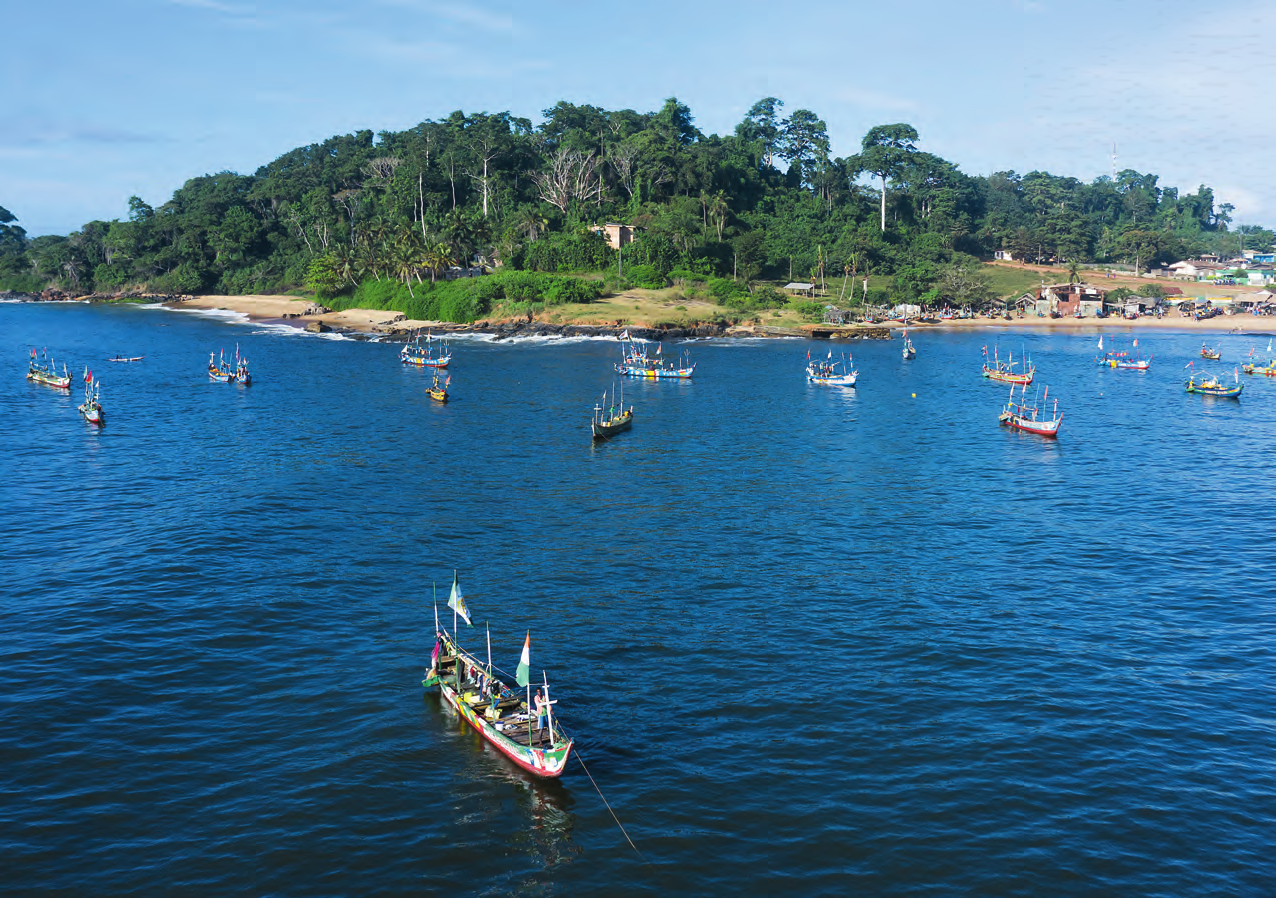Environment
The crucial issues of sustainable development

The upheavals caused by global warming are becoming increasingly tangible. Preparing for the future means addressing key challenges.
Today, Côte d'Ivoire has a population of almost 28 million, a figure that will only increase in the near future. Combining demographic and economic growth is a real challenge, compounded by the necessity of implementing sustainable development and the need to preserve a very fragile ecosystem. At COP26 in Glasgow, Scotland, the “Cocoa Republic” committed itself to reducing its greenhouse gas emissions by 30.41% by 2030. This is a major and indispensable endeavour as the wealth of the country, where the economy is largely based on agriculture, is rooted in its fertile land. To sustain progress and meet the targets set for 2030, a transition to green growth is beyond vital, and there are many aspects to it.
Climate change realities
The ranking of countries considered most vulnerable to the dangers of global warming positions Côte d'Ivoire 147th out of 178 nations. The average temperature is already rising, resulting in excessive heat, erratic rainfall, irregular rainy seasons and frequent flooding. The harmattan, a dry desert wind, now blows for almost three months, whereas only a decade ago it lasted a fortnight. The rise in sea levels is likely to have serious consequences, particularly for Abidjan and the coastal lagoons. This change is visible to the naked eye along the coast, where the former town of Grand-Lahou, threatened by the advancing Atlantic, has retreated inland.

Global warming is also causing an increase in the number of people migrating from the Sahel to Côte d'Ivoire, something that is very apparent in Abidjan and other cities in the country. These regions are not only extremely vulnerable to terrorism, but are also suffering from the scarcity of water and unpredictable rainfall. People are heading south, which they perceive to be a close and safe destination.
Climate change could also have an impact on one of the country's most important crops. The country is the world's largest exporter of cocoa, producing around 2 million tonnes per year. Rising temperatures could make the land drier and less fertile. This will lead to a drop in production, because with poorer soil, plantations will have to be moved to higher altitudes, where temperatures will be more favourable.
Confronted with these protean threats, the State, civil society and economic stakeholders are gradually mobilising. But, as with other emerging countries, the question of massive financing of the transition, and therefore that of a show of solidarity from rich and polluting nations, remains. While waiting for this improbable international solidarity, Côte d'Ivoire could apply the Polluter-Pays Principle more widely. This would kill two birds with one stone. On the one hand, it would obtain new tax revenues and, on the other, industries and individuals could foster innovative solutions and initiate a virtuous cycle of sustainable development.
Forest preservation
On 17 November 2021, the European Commission presented a draft law to close the EU market to any product implicated in deforestation. This new regulation could apply to soya, timber, cocoa, coffee, palm oil and beef, as well as to some of the derivative products, such as leather and furniture. Forests have become a global issue. The rainforest in particular plays a role in regulating global warming, influencing the rainfall needed for food crops and preventing temperatures from rising. It also contributes to the protection of fauna and the survival of biodiversity. In Côte d'Ivoire, the situation is urgent. Over the past 60 years, 90% of the country's forest has disappeared. Its exploitation, and the timber sector, which was for a long time the third largest export product, have played a major role in this rapid deforestation. One of the direct reasons for this is the predominant focus on industrial cash crops (cocoa, rubber, and oil palm, etc.), together with urbanisation and demographic pressure.
The country has embarked on a major project to preserve and rehabilitate the remaining forests, as well as to implement the concept of agroforestry in intensively farmed areas. The current estimated forest cover is 2.97 million hectares, or only 9.2% of the country. The government is determined to increase this to 20% by 2030, with substantial support from international donors. In July 2021, the Minister of Water and Forests, Alain-Richard Donwahi, presented the National Forestry and Wildlife Inventory, an essential component of the project and in May 2021, the ministry launched the “1 Day, 50 Million Trees” campaign, a target to be reached by the end of the year. To date, it is estimated that over 28 million trees have been planted. This is yet one step further in the long-term fight for the benefit of future generations.
The plastic waste scourge
In the early 1960s, there were 150,000 people living in Abidjan. Now, only a few decades later, it has become a sprawling metropolis with a population of around 5 million. The city is continuously expanding. One of the consequences of its relentless population growth is a sharp increase in the overall generation of waste every year. It is estimated that the city produces more than 1.6 million tonnes of waste per year and almost 290 tonnes of plastic waste per day. Of this waste, 95% ends up in more or less well-managed landfills or in the wild, where it accumulates in the Abidjan lagoon and enters and exits towns and villages. It flows into the streams and rivers all the way to the mouths, threatening the breeding of aquatic species necessary to feed the population. In May 2013, there was a decree banning the production, import, marketing, possession and use of plastic bags, a measure that is difficult to apply and enforce. However, new collection solutions are arising. Start-ups are coming up with innovative methods. For example, Recyplast has introduced the Plastock project, with a mobile application and collection boxes to encourage citizen recycling. The initiative has proved its worth and will be rolled out in other districts and municipalities.
A hugely important developmental initiative has also been decided upon, involving the closure of the massive Akouédo landfill on the outskirts of the economic capital, and the rehabilitation of this particularly polluted site. The dump will be transformed into an urban park. The company PFO is carrying out the project, which will include green spaces, playgrounds and sports areas, as well as the construction of a training centre for environment-related professions.
Combating illegal gold mining
Côte d'Ivoire is located on the West African Birimian belt, a very large geological formation rich in gold and minerals. As such, all the countries located on this belt have enormous mining potential, which Côte d’Ivoire has been able to capitalise on. In 2020, the Tongon mine in the north produced 9.1 tonnes of gold, a record in its 10 years of operation. The mining sector accounts for 5% of the country's GDP, a figure that could increase as new mines enter into operation.
Unfortunately, illegal gold mining is emerging on the fringes of this formal sector, particularly in the Mé region in the south. The techniques used by these miners to extract gold are not only harmful to the environment, but also to the miners' health. They use toxic chemicals such as mercury to remove the precious metal from the rock. These chemicals then pollute bodies of water and are in turn absorbed by biota and eventually reach humans through the food chain. Furthermore, the miners clear the land completely in order to mine it, thereby ruining it for agriculture. The state has undertaken to tackle these illegal activities. In 2018, the Ministry of Mines announced the establishment of a special brigade to crack down on illegal mining and prosecute all mining code violations. The ministry has also opened training camps for mineworkers and others in the sector. However, controlling the area remains a complex task.

Saving the mangroves
Nestled between land and sea, mangrove forests are rich and fragile ecosystems made up mainly of mangrove trees growing on tropical coastlines. As one of the world's most productive ecosystems, they play an important role for local populations. With their high CO2 absorption capacity, they help curb global warming and provide an environment in which marine life thrives, which is why fishermen cast their nets near them. Côte d'Ivoire's mangroves are an element of stability and diversity, yet it they are in danger of disappearing. According to a study conducted by Philippe Cecchi, a researcher at France's Research Institute for Development, and Allassane Ouattara, a professor and researcher at Abidjan's Nangui Abrogoua University, the area covered by mangroves has decreased by nearly 95% in less than 50 years, from 500 km² in 1970 to around 30 km² in 2013.
The main reasons for this are the excessive logging of mangrove trees, used for firewood by the local communities, and the destruction of the mangrove environment to make way for urban expansion and infrastructure development. There are also natural phenomena, such as the recurrent silting up of the channels linking the lagoon to the sea, flooding and coastal erosion. Human pollution remains a determining factor. The vast majority of Abidjan's urban and industrial effluents arrive in the Ebrié Lagoon with little or no treatment, contributing to the degradation of water quality, which is highly detrimental to mangroves. The various sanitation and development projects in Cocody Bay should, in the long term, enable the restoration of an ecological balance. Cleaning up the bay will have a positive impact on the mangroves surrounding Abidjan, particularly that of Boulay Island. This operation, deployed on a country-wide scale, would give the mangroves – and the lagoons – a new lease of life.